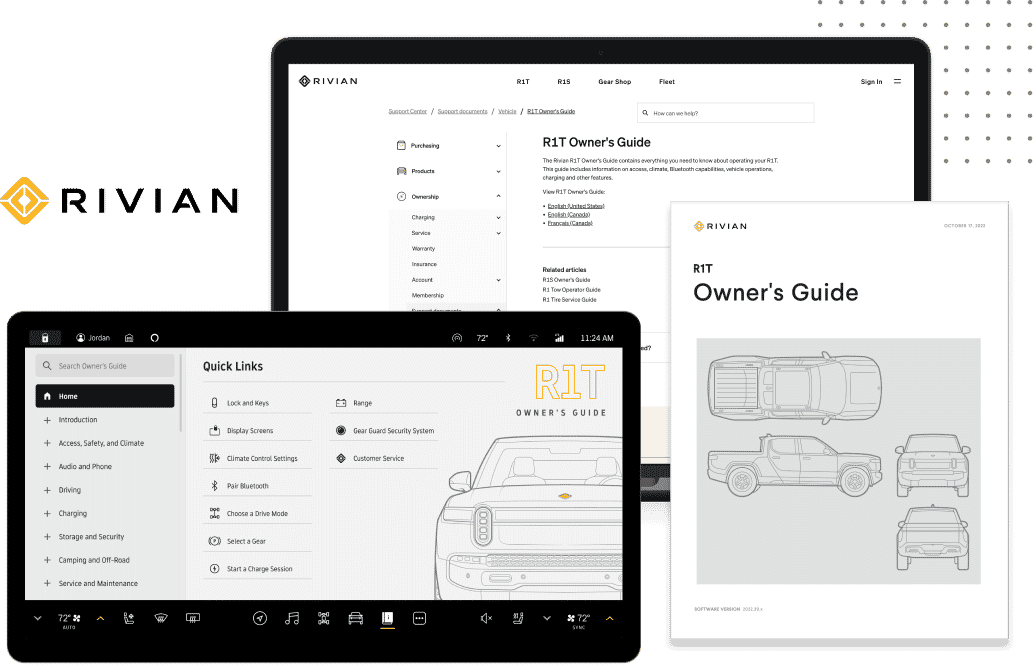In The Press
Towson University Uses MadCap Flare to Teach Online Help Authoring Best Practices
Towson Students Take Advantage of Flare’s Ease-of-Use, Native XML, and Flexible Workflow Support to Create State-of-the-Art, Topic-Based Online Documentation
La Jolla, CA, USA – January 6, 2009 – MadCap Software, the leader in multi-channel content authoring and a showcase company for Microsoft (NASDAQ: MSFT) Visual Studio 2005 and Microsoft XPS, today announced that Towson University is using MadCap Flare to teach best practices in authoring online Help. Flare, MadCap’s flagship multi-channel authoring software, is enabling Towson students with little or no technical writing background to create state-of-the-art, structured online content based on the XML standard. In doing so, students are gaining valuable expertise required to support the real-world documentation needs of today’s businesses and government organizations.
As a metropolitan university located just outside of Baltimore, Towson has several programs designed to prepare students for professional careers. One of those programs is its Professional Writing Master of Science graduate program, which in 2008 has added a new track in Technical Writing and Information Design. Led by David Dayton, a Towson professor and PhD in technical communication and rhetoric, the program features the university’s first Creating Online Help class. Dayton who teaches the class, has implemented MadCap Flare as the authoring solution of choice for helping students to develop and publish online user assistance in the form of both Web Help and compiled HTML Help.
“For our new Creating Online Help, we needed authoring software that would enable students to practice Help content development and publishing best practices first hand,” said Professor Dayton. “MadCap Flare has helped us to meet and exceed our goals. In the first semester this class was offered, every student created a project that showed off all the essential features of online Help—and in some cases a few more, using features in Flare not available with older authoring tools.”
Professor Dayton had previously taught technical writing classes at another university using Adobe® FrameMaker®, RoboHelp® and DreamWeaver. For the Towson class, he chose to use MadCap Flare because it offered an innovative, topic-based approach to content publishing; supported XML, the emerging standard for enterprise content; was affordable; and was capable of producing modern WebHelp and HTML Help.
“Originally, I was concerned about using XML-based authoring software to teach a class to non-technical students. However, the XML editor in Flare allowed students to use XML before they understood it,” Professor Dayton said.
He adds, “I like the way the Flare editor shows the XML structure on the side. Because of the way XML is exposed in Flare, students can get a fundamental understanding of XML without being overwhelmed by the language, itself.”
Another important aspect of Flare is that its topic-based approach to content development is flexible and supports an author’s preferred workflow and processes.
“A big barrier to adopting authoring tools is that many of them require writing teams to re-engineer their processes,” Professor Dayton noted. “Flare offers a way to develop better documentation and online Help without having to shutdown and re-engineer the processes you already have. Businesses need tools like Flare, which allow you to make a smooth transition.”
The ability of Flare to import Microsoft Word also provided a practical benefit for the class. Because students only had two-and-a-half hours of lab time each week to work with Flare, they needed a
way to develop their Help topics in Word at home and then import those topics into Flare during class. Additionally, the editor in Flare 3.0 was designed for more technical users, so allowing students to create their topics in Word helped to speed development time. Significantly, when students imported their topics from Word, Flare retained all the formatting.
However, Professor Dayton says, “Going forward, our classes may no longer need to rely on a two-step process to create their online Help projects. I had an opportunity to see a demo of Flare 4.0 at a recent training session. With the more intuitive and responsive interface in version 4.0, it looks like my students will be able to author and publish their content using only Flare.”
In the meantime, Professor Dayton is excited by the early success of the program, noting, “We have several students who have used their classroom online Help projects to address needs within the companies where they are working and have been able to create online Help solutions that are far superior. It’s a very promising start.”
“Towson University recognizes that, in today’s competitive employment environment, graduates need to come to the market with specific professional skills, said Anthony Olivier, MadCap co-founder and CEO. “We are excited by Towson’s commitment to help students prepare for careers in technical communications, and are honored by the role of our cutting-edge Flare software in helping them to gain expertise in best practices for online documentation.”
About Towson University
Founded in 1866, Towson University is recognized among the nation's best regional public universities, offering more than 100 bachelor's, master's and doctoral degree programs in the liberal arts and sciences, and applied professional fields. With more than 20,000 students, Towson University is the second-largest public university in Maryland. Towson is a metropolitan university located eight miles north of Baltimore, which combines research-based learning with practical application. Its many interdisciplinary partnerships with public and private organizations throughout Maryland provide opportunities for research, internships and jobs. Towson University is a founding member of the Coalition of Urban and Metropolitan Universities (CUMU); TU President Robert Caret holds the office of president. Additional information can be found at www.towson.edu.
About MadCap Software
MadCap Software is a trusted resource for thousands of companies around the globe for single-source, multi-channel authoring and publishing solutions designed to streamline the process of developing and delivering training content, learning and development programs, technical documentation, online Help, knowledge bases, and more. From authoring, publishing and translation, to cloud-based content management system, to contribution and review in the cloud, you can streamline content delivery and manage the entire content development lifecycle with MadCap Software. MadCap Software’s services include product training, consulting services, translation and localization, and an advanced developer certification program. Headquartered in San Diego, California, with offices in Austin, TX, MadCap Software is home to some of the most experienced software architects and product experts in the content development industry.




